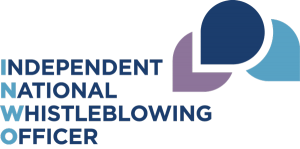Whistleblowing is the process of raising safety concerns about issues, incidents or working practices which could be risky or potentially harmful to patients or colleagues.
You can find the full definition of whistleblowing and some examples of the kind of things that might be classed as whistleblowing on the Independent National Whistleblowing Officer website.
Everyone benefits if concerns can be raised early and dealt with promptly and professionally. The process set out in the National Whistleblowing Standards is a formal process, however staff are encouraged to raise concerns before they get to the formal stage, and managers are asked to listen and learn from staff’s concerns.
How to raise a concern
Using existing processes and policies
In many cases, concerns can be resolved through informal conversations with colleagues and managers, and through ordinary or ‘business as usual’ processes (such as incident reporting systems or raising an issue in a shift handover meeting). All staff are therefore encouraged to raise any concerns using existing processes which may vary depending on your employer. In NHS Forth Valley staff can continue to raise any concerns with their line manager, in the first instance. They can also seek support and advice from HR, staff-side representatives and occupational health, in line with existing policies and procedures. Details of the support available to staff and copies of current national and local policies (including the Bullying and Harassment Policy and Grievance Policy) can be found in the HR Connect section of NHS Forth Valley’s staff intranet. In addition, HR Connect has a range of employment information and advice. Staff can also ask questions specific to their own employment circumstances by contacting the HR Operational team through the HR Connect help desk which is open daily and available to all staff..
Using the Whistleblowing Standards
If concerns have still not been resolved or you wish to raise a concern directly using the whistleblowing standards please see the local guide (below) which sets out the arrangements and procedures in NHS Forth Valley.
Concerns can be raised under Stage 1 of the whistleblowing process which aims to resolve the issues through local resolution or Stage 2 of the process if the concerns are relate to more serious or complex issues that need investigation. You can also email fv.confidentialcontact@nhs.scot or call 07815478106 (monitored by Pauline Donnelly – Confidential Contact & Speak Up Ambassador)
Speak Up Service and Confidential Contacts
 A number of Speak Up Advocates have also been appointed to support the new whistleblowing standards and provide wider support, guidance and advice to local staff. Speak Up Advocates also act as confidential contacts to provide a safe space for you to discuss your concerns and to give you the information you need. They will have the knowledge and skills to help you to raise your concern with the appropriate manager. To find out more more about the Speak Up service, including details of our local Speak Up Advocates visit the Speak Up section of the website.
A number of Speak Up Advocates have also been appointed to support the new whistleblowing standards and provide wider support, guidance and advice to local staff. Speak Up Advocates also act as confidential contacts to provide a safe space for you to discuss your concerns and to give you the information you need. They will have the knowledge and skills to help you to raise your concern with the appropriate manager. To find out more more about the Speak Up service, including details of our local Speak Up Advocates visit the Speak Up section of the website.
Bringing your complaint to the Independent National Whistleblowing Officer (INWO)
 The INWO will investigate complaints and, where needed, recommend action for the NHS organisation to take. In addition to complaints, the INWO has a national leadership role providing support and guidance to NHS organisations, focusing on appropriate early resolution, and good practice in whistleblowing handling, recording, reporting, learning and improvement. The ultimate aim is to ensure that patients received a good, safe service from a well-run NHS in Scotland. The INWO is the final stage of the process for those raising concerns. The INWO can consider complaints about:
The INWO will investigate complaints and, where needed, recommend action for the NHS organisation to take. In addition to complaints, the INWO has a national leadership role providing support and guidance to NHS organisations, focusing on appropriate early resolution, and good practice in whistleblowing handling, recording, reporting, learning and improvement. The ultimate aim is to ensure that patients received a good, safe service from a well-run NHS in Scotland. The INWO is the final stage of the process for those raising concerns. The INWO can consider complaints about:
- Any actions taken by your organisation in response to your concerns
- Whether your organisation followed the process laid out in the Standards
- How you were treated during and after you raised a concern
- How the organisation supports a culture of speaking up
The INWO is able to investigate complaints and, if appropriate, carry out an external review to come to a decision. If you are unhappy with a decision on your complaint, you will have an opportunity to provide comments and express why you feel the decision is not correct. More information about the Independent Whistleblowing Officer and their role can be found on the INWO website. You can also contact the national advice line free on 0800 008 6112 (from 9am-1pm on Mondays, Wednesdays and Fridays, and from 12-4pm on Tuesdays and Thursdays) or via email inwo@spso.gov.scot.


 Whistleblowing is the process of raising safety concerns about issues, incidents or working practices which could be risky or potentially harmful to patients or colleagues.
Whistleblowing is the process of raising safety concerns about issues, incidents or working practices which could be risky or potentially harmful to patients or colleagues.